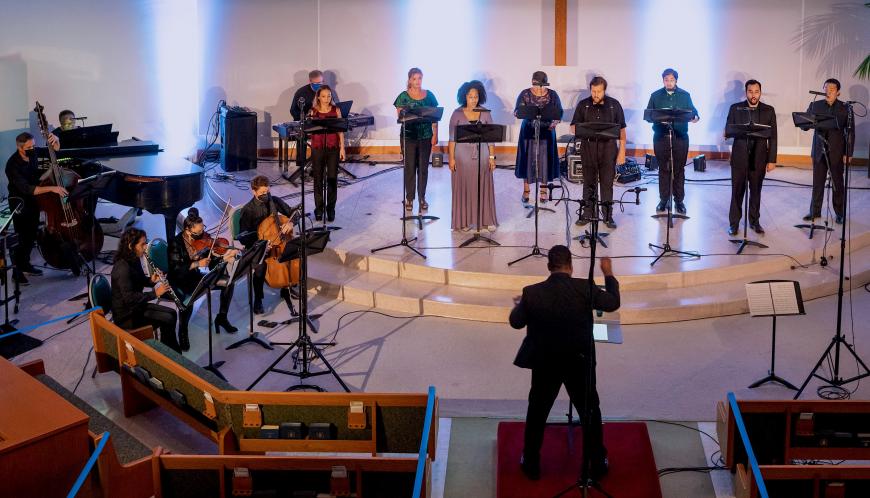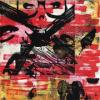
Every music-presenting organization or enterprise has its own COVID-timed tale of exit and reentry to tell. In the case of the formidable contemporary-modern, Los Angeles-based Jacaranda series, live, crowd-attended concert operations abruptly ended in March 2020, and resumed — on another seemingly ominous note — on Sept. 11, 2021.
Aptly and expectedly, the program dubbed “Twin Towers” (extra branding point for cross-referencing the opening piece by Joan Tower) landed on the 20th anniversary of 9/11, featuring music and texts all about 9/11. From another specific vantage of historic interest, the evening ended on a high, profound note with the West Coast premiere of Anthony Davis’s 2002 Restless Mourning, music deserving greater recognition.
Ironically or not, the one piece here that predated ground-zero was Samuel Barber’s Adagio for Strings, now a virtual 9/11 memorial anthem and an inevitable cornerstone of this Jacaranda event. It arrived, delivered with admirable restraint and slow culminating force by the series’ resident Lyris Quartet. The Lyris commanded the spotlight in the concert’s first half, which opened with Tower’s visceral, veritable Adagio deconstruction, In Memory, moved through Steve Reich’s stark WTC 9/11, and closed with the Barber.

9/11 history aside, Barber’s Adagio could just as easily be a signature balm for the ongoing tragedy and collective wounded soul of our current pandemic era. This adapted relevance helped make the concert a cathartic event in both historic and present tenses, and suitably served by the spiritualized atmosphere of Jacaranda’s home base venue, the First Presbyterian Church in Santa Monica.
Founding Jacaranda director Patrick Scott introduced the evening, explaining that he felt “it was important to put music into the conversation” of this landmark tragedy, 20 years later. Steve Reich’s WTC 9/11, written in the tenth anniversary year of 2011, literally illustrates the same idea, inserting is rippling and jagged minimalist score for string quartet with archival text bites of 911 calls, emergency radio chatter, and personal interviews. In WTC 9/11, what felt closer to the bone and the pained heart upon release a decade ago now takes on an added patina of historic remembrance, akin to Reich’s Holocaust-related Different Trains.
Clearly, though, the main event here was the overdue revival of Anthony Davis’s striking four-part settings of texts by Quincy Troupe, Allan Havis, and a Biblical consult with Psalms. Although written in 2002, the piece for chorus, chamber-ensemble-meets-rhythm section, and electronics now stands a stronger chance for the credit it is due thanks to the rightful buzz afforded the composer’s 2020 Pulitzer Prize-winning opera Central Park Five (premiered just down the road by the Long Beach Opera, in June 2019).

In this reflection on 9/11 with a clear prism of Black experience and culture, Davis effectively draws on his natural fluidity of expressive powers from different idiomatic corners, from jazz to gospel to contemporary “classical” syntax. Powered by a strong assembly of players, with the nine-piece vocal group Tonality and a smartly equipped instrumental group dubbed the “Jacaranda Chamber Ensemble,” with conductor Anthony Parnther keeping the connections taut, Restless Mourning made a bold, memorable impact in Santa Monica.
Troupe’s texts, “Blue” and “Things Would Never, Ever Be the Same” are taken from the poetry compendium 911; An Emergency Call, and chillingly convey bracing specifics of that horrific day and place while also addressing the gnawing confusion and sense of inner chaos on that “crystal clear morning.”
In the work’s stirring — and innately disturbing — centerpiece, Davis sets playwright Havis’s The Pilot of a 767, a painful saga of the doomed pilot, in duly restless musical terms. A bluesy waltz morphs into a retooled tango variation, building to a knotty climax and an electro-acoustic mash-up around the mantra “I am the pilot of Allah.” A haunting choral clarity emerges in a coda section, as the chorus intones a broader symbolic angle on the lost pilot: “I am the pilot of innocence.”
Lastly, Psalms 102 comes to an emotional rescue of sorts, in a work naturally inclined towards suspension of belief and dissonant emotional terms. Here, Davis draws on the healing language of gospel and his most overt jazz references of the piece, with a riff ostinato passed from double bass/piano left hand to the singers and back, with a breeze of swing inflection easing into a shuffle. In the end, Davis has plotted a cautiously heartening finale, tinged with hope. Or at least a sense of hope for hope’s arrival.
“Twin Towers” was a full plate of ideas and intentions, and a satisfying return for this significant musical conversation piece of a series.




